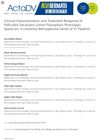7 citations,
January 2016 in “Dermatology online journal” Persistent pulling on hair can cause permanent hair loss.
 3 citations,
May 2020 in “Journal of The European Academy of Dermatology and Venereology”
3 citations,
May 2020 in “Journal of The European Academy of Dermatology and Venereology” Topical booster improves hair loss treatment effectiveness.
 15 citations,
April 2020 in “Journal of The American Academy of Dermatology”
15 citations,
April 2020 in “Journal of The American Academy of Dermatology” Oral minoxidil can increase or maintain hair thickness in most people with lichen planopilaris, with mild side effects.
24 citations,
August 2009 in “Expert opinion on pharmacotherapy” The combination of calcipotriene and betamethasone is more effective and has fewer side effects for treating psoriasis.
 12 citations,
January 2020 in “Skin appendage disorders”
12 citations,
January 2020 in “Skin appendage disorders” Low-dose oral minoxidil effectively treats female hair loss with good safety.
 1 citations,
July 2024 in “Journal of Cosmetic Dermatology”
1 citations,
July 2024 in “Journal of Cosmetic Dermatology” Low SULT activity in hair follicles leads to better response to oral minoxidil for hair loss.
 November 2019 in “Actas Dermo-Sifiliográficas”
November 2019 in “Actas Dermo-Sifiliográficas” Oral minoxidil helps treat hair loss and has reversible side effects.
May 2019 in “Journal of Acupuncture Research” Sebalgukhwa-san (SGS) can help treat hair loss without liver toxicity.
 8 citations,
April 2020 in “Journal of The American Academy of Dermatology”
8 citations,
April 2020 in “Journal of The American Academy of Dermatology” Bicalutamide may be a promising alternative treatment for female pattern hair loss.
 47 citations,
April 2020 in “Dermatologic Therapy”
47 citations,
April 2020 in “Dermatologic Therapy” Androgenetic alopecia linked to COVID-19 severity; drugs reducing androgen receptor activation may help.
 4 citations,
December 1994 in “PubMed”
4 citations,
December 1994 in “PubMed” Cyproterone acetate with estradiol improved women's self-confidence and emotional well-being without a difference between oral or transdermal methods, but younger women preferred the oral method.
 19 citations,
November 2017 in “Journal of Pharmaceutical Sciences”
19 citations,
November 2017 in “Journal of Pharmaceutical Sciences” A new gel containing minoxidil can treat hair loss effectively, potentially reducing side effects and improving treatment.
 June 2024 in “JEADV Clinical Practice”
June 2024 in “JEADV Clinical Practice” Severe alopecia areata patients have a low chance of spontaneous hair regrowth.
 February 2024 in “Acta dermato-venereologica”
February 2024 in “Acta dermato-venereologica” This type of hair loss is probably often missed and treatments reducing inflammation might work well.
 September 2023 in “Journal of The American Academy of Dermatology”
September 2023 in “Journal of The American Academy of Dermatology” Adolescents with hair loss show different hormone levels by sex and often have related metabolic issues.
 10 citations,
March 2016 in “Journal of The American Academy of Dermatology”
10 citations,
March 2016 in “Journal of The American Academy of Dermatology” Antiandrogenic drugs could be a good treatment option for frontal fibrosing alopecia.
50 citations,
December 2017 in “Nanoscale” Polymeric micelle nanocarriers deliver adapalene more effectively to hair follicles than commercial products.
 37 citations,
February 2014 in “Journal of Dermatology”
37 citations,
February 2014 in “Journal of Dermatology” Valproic acid increases hair count in men with hair loss.
 8 citations,
December 2016 in “Revista Medica De Chile”
8 citations,
December 2016 in “Revista Medica De Chile” Finasteride can cause sexual dysfunction, sperm changes, and affect bone density and metabolism.
 November 2020 in “Journal of The American Academy of Dermatology”
November 2020 in “Journal of The American Academy of Dermatology” Men with male pattern baldness may be more at risk for severe COVID-19, and anti-androgen treatments could offer protection.
74 citations,
April 2017 in “JEADV. Journal of the European Academy of Dermatology and Venereology/Journal of the European Academy of Dermatology and Venereology” Researchers found three patterns of Frontal fibrosing alopecia, with Pattern III having the best prognosis after treatment.
 31 citations,
February 2014 in “Journal of dermatological science”
31 citations,
February 2014 in “Journal of dermatological science” Placental growth factor may help treat hair loss.
 32 citations,
July 2021 in “Journal of The American Academy of Dermatology”
32 citations,
July 2021 in “Journal of The American Academy of Dermatology” Hair loss from COVID-19 usually starts around 45 days after infection and lasts about 47.5 days.
 39 citations,
February 2021 in “Journal of The American Academy of Dermatology”
39 citations,
February 2021 in “Journal of The American Academy of Dermatology” Low-dose oral minoxidil safely treats hair loss, with hypertrichosis as main side effect.
18 citations,
February 2018 in “Journal of the American Academy of Dermatology” The document suggests a possible link between frontal fibrosing alopecia and rosacea.
 14 citations,
March 2022 in “Macromolecular Rapid Communications”
14 citations,
March 2022 in “Macromolecular Rapid Communications” Polymer microneedles are a promising, painless alternative to traditional needles for delivering drugs through the skin.
 48 citations,
June 2013 in “Journal of Dermatological Science”
48 citations,
June 2013 in “Journal of Dermatological Science” Valproic acid may help hair grow and could be a safe treatment for hair loss.
27 citations,
May 2016 in “Integrative Cancer Therapies” Chrysin makes docetaxel more effective and reduces its side effects in lung cancer treatment.
 November 2021 in “Open Forum Infectious Diseases”
November 2021 in “Open Forum Infectious Diseases” Some COVID-19 pneumonia patients in Veracruz, Mexico had rare skin issues like temporary hair loss linked to disease severity.
16 citations,
February 2009 in “Clinical neurology and neurosurgery” Switching to extended-release divalproex sodium improved patient-reported tremor but did not change seizure frequency or most side effects.





















